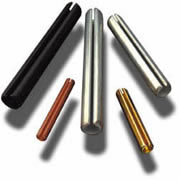
Are you looking to buy spring pins? Spring pins offer a quick and easy way to secure parts. Also known as tension pins, they are cylindrical-shaped fasteners.
Spring pins are designed specifically for use in holes with a smaller diameter. When inserting a spring pin into a hole with a smaller diameter, the spring pin will deform while simultaneously exerting a force against the walls of the hole. There are several things you should consider, however, when choosing spring pins.
Slotted vs Coiled
Most spring pins fall under one of two categories: slotted or coiled. Slotted spring pins are the most common. They are hollow, cylindrical pieces of metal with a narrow vertical hole running down the side. With this hole, slotted spring pins are able to deform to create a spring-like action.
Coiled spring pins use a different design. As their name suggests, they consist of a piece of coiled metal. A sheet of thin metal is wrapped several times in a cylindrical shape to create a coiled spring pin.
Corrosion-Resistant Material
You should choose spring pins made of a corrosion-resistant material. Whether you use them indoors or outdoors, they will inevitably be exposed to moisture. There’s always moisture in the air, which is represented by the surrounding humidity level. High humidity levels indicate excess moisture vapor. And exposure to this moisture vapor may cause some spring pins to rust or corrode.
Fortunately, spring pins are available in corrosion-resistant materials. Some of them are made of aluminum. Aluminum offers a high level of protection against corrosion. You can also find spring pins in stainless steel and other corrosion-resistant alloys.
Diameter
Whether you prefer slotted or coiled spring pins, you’ll need to consider the diameter. The diameter of a spring pin must be larger than the hole in which you intend to place it.
Like traditional compression springs, spring pins work by deforming. When you place a spring pin in a hole with a smaller diameter, it will deform. The spring-like properties of these pins allow them to press against the walls of the hole, thus holding the part or parts in place.
When choosing spring pins, make sure the diameter is larger than the hole in which you intend to place them. If a spring pin’s diameter is smaller than the hole’s diameter, you won’t be able to use it. Both slotted and coiled spring pins must have a larger diameter than the hole.



